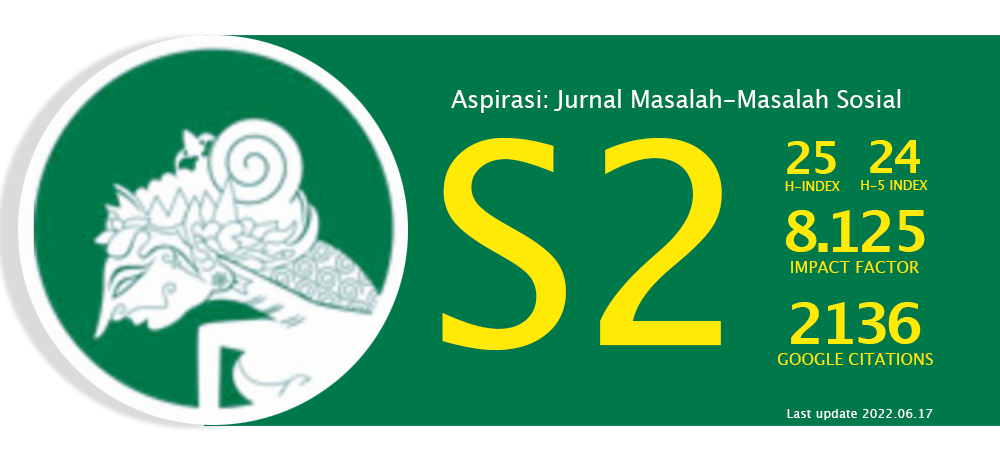Model Hubungan Religiositas dan Dukungan Sosial dengan Kesejahteraan Psikologis Mahasiswa Melalui Mediasi Strategi Koping
Abstract
Well-being achievement and the ability to have self-actualization are everyone’s desire. However, the daily routine causes fluctuation of minds and feelings that affect mental state. College students are one of vulnerable groups who are prone to get stress or mental health problems. Suicides committed by college students prove a condition of low psychological well-being. This research aims to find the model of college students’ psychological well-being which is predicted by religiosity and social support with coping strategy as the mediator. Researchers used convenience sampling technique to get 145 respondents consisting of 33 males (23%) and 112 females (77%). SEM (Structural Equation Modeling) is used to analyze finding data. The results showed that coping strategy can mediate the correlation between religiosity with psychological well-being. Coping strategy cannot be proved as a mediator in the correlation between social support and psychological well-being. Social support has a positive significant correlation with psychological well-being without a coping strategy as a mediator.
Abstrak
Mencapai sejahtera dan mampu beraktualisasi diri merupakan keinginan setiap individu. Namun, rutinitas sehari-hari memungkinkan adanya fluktuasi pikiran dan perasaan yang memprediksi kondisi mental. Mahasiswa termasuk salah satu kelompok rentan yang mudah mengalami gangguan kesehatan mental. Kasus bunuh diri yang dilakukan oleh mahasiswa membuktikan kondisi kesejahteraan psikologis yang rendah. Penelitian ini bertujuan untuk mengetahui model kesejahteraan psikologis mahasiswa dengan faktor religiositas dan dukungan sosial yang dimediasi strategi koping. Responden dalam penelitian ini didapat dengan teknik convenience sampling berjumlah 145 mahasiswa yang terdiri dari 33 laki-laki (23%) dan 112 perempuan (77%). Analisis SEM (Structural Equation Modelling) digunakan sebagai metode analisis data dalam penelitian ini. Hasil penelitian menunjukkan adanya mediasi yang signifikan oleh strategi koping dalam korelasi religiositas dengan kesejahteraan psikologis. Strategi koping tidak terbukti mampu menjadi mediator hubungan dukungan sosial dengan kesejahteraan psikologis. Dukungan sosial memiliki hubungan secara langsung yang signifikan dengan kesejahteraan psikologis.
Keywords
Full Text:
pdfReferences
Aldwin, C. M., & Revenson, T. A. (1987). Does coping help? A reexamination of the relation between coping and mental health. Journal of Personality and Social Psychology, 53(2), 337–348.
Alleyne, M., Alleyne, P., & Greenidge, D. (2010). Life satisfaction and perceived stress among university students in Barbados. Journal of Psychology in Africa, 20(2), 291– 297.
Ancok, D., Suroso, F. N., & Ardani, M. S. (2000). Psikologi Islami: Solusi Islam atas problem-problem psikologi. Yogyakarta: Pustaka Pelajar.
Andartastuti, S. (2015). Hubungan antara coping strategy dengan subjective well- being pekerja seks komersial di Kota Bandung. [Skripsi]. Universitas Pendidikan Indonesia, Jawa Barat.
Baqutayan, S. M. S. (2015). Stress and coping mechanisms: a historical overview. Mediterranean Journal of Social Sciences,6(2 S1), 479–488. doi: 10.5901/mjss.2015. v6n2s1p479
Bastaman, H. D. (1996). Meraih hidup bermakna: Kisah pribadi dengan pengalaman tragis. Jakarta: Paramadina.
Bruffaerts, R., Mortier, P., Kiekens, G., Auerbach, R. P., Cuijpers, P., Demyttenaere, K., Green, J. G., Nock, M. K., & Kessler, R. C. (2018). Mental health problems in college freshmen: Prevalence and academic functioning. Journal of Affective Disorders, 225(1), 97–103. doi: 10.1016/j.jad.2017.07.044
Carver, C. S., Scheier, M. F., & Weintraub, J. K. (1989). Assessing coping strategies: A theoretically based approach. Journal of Personality and Social Psychology, 56(2), 267–283.
Darmawanti, I. (2012). Hubungan antara tingkat religiositas dengan kemampuan dalam mengatasi stres (coping stress). Jurnal Psikologi Teori Dan Terapan, 2(2), 102– 107. doi: 10.26740/jptt.v2n2.p102-107
Efficace, F., Breccia, M., Cottone, F., Okumura, I., Doro, M., Riccardi, F., Rosti, G., & Baccarani, M. (2016). Psychological well-being and social support in chronic myeloid leukemia patients receiving lifelong targeted therapies. Supportive Care in Cancer, 24(12), 4887–4894. doi: 10.1007/s00520-016-3344-6
Fitriani, A. (2016). Peran religiositas dalam meningkatkan psychological well being. Al-Adyan: Jurnal Studi Lintas Agama, 11(1), 57–80. doi: 10.24042/ajsla.v11i1.1437
Grossmann, I., Na, J., Varnum, M. E. W., Kitayama, S., & Nisbett, R. E. (2013). A route to well-being: Intelligence versus wise reasoning. Journal of Experimental Psychology: General, 142(3), 944–953. doi: 10.1037/a0029560
Hair, J. F., Black, W. C., Babin, B. J., & Anderson, R. E. (2010). Multivariate data analysis: International version (7th ed.). Harlow: Pearson Education.
Handayani, D. (2018). Dukungan sosial dan adaptasi kehidupan kampus pada mahasiswa perantau di Universitas Islam Indonesia(Skripsi). Universitas Islam Indonesia, Yogyakarta.
Handika, C. (2017). Hubungan antara acceptance of disability dan dukungan sosial pada penyandang disabilitas tidak dari lahir (Skripsi). Universitas Islam Indonesia, Yogyakarta.
Hardjo, S., & Novita, E. (2015). Hubungan dukungan sosial dengan psychological well-being pada remaja korban sexual abuse. Analitika: Jurnal Magister Psikologi UMA, 7(1), 12–19.
Haryanto. (2019, September 6). Mahasiswa S2 ITB bunuh diri, polisi temukan pesan terakhir, obat depresi dan lagu yang diputar. Tribunnews.com. Diakses dari https://www.tribunnews.com/ regional/2019/09/06/mahasiswa-s2-itb- bunuh-diri-polisi-temukan-pesan-terakhir- obat-depresi-dan-lagu-yang-diputar, pada 2 Mei 2021.
Hidayati, N. (2011). Dukungan sosial bagi keluarga anak berkebutuhan khusus. INSAN, 13(1), 12–20.
Holmes-Smith, P. (2001). Introduction to structural equation modeling using LISREL. ACSPRI-Winter Training Program, Perth.
Irwanti, M. (2014). Hubungan antara kekhusyukan shalat dengan kesejahteraan psikologis pada mahasiswa UMS Surakarta (Skripsi). Universitas Muhammadiyah Surakarta, Jawa Tengah.
Khalika, N. N. (2019, Januari 5). Depresi karena skripsi, kampus & dosen wajib menolong mahasiswa. Tirto.id. Diakses dari https:// tirto.id/depresi-karena-skripsi-kampus- dosen-wajib-menolong-mahasiswa-ddqy, pada 2 Mei 2021.
Khan, A., & Achour, M. (2011). Social support and religiosity as coping strategies for reducing job stress. In International Conference on Business and Economics Research, Vol. 1, pp. 291–293.
King, L. A. (2010). Psikologi umum: Sebuah pandangan apresiatif. Jakarta: Salemba Humanika.
Kline, R. B. (2015). Principles and practice of structural equation modeling. New York: Guilford Publications.
Koenig, H. G. (2018). Religion and mental health: Research and clinical applications . Massachusetts: Academic Press.
Lazarus, R. S., & Folkman, S. (1984). Stress, appraisal, and coping . New York: Springer Publishing Company.
Linawati, R. A., & Desiningrum, D. R. (2018). Hubungan antara religiositas dengan psychological well-being pada siswa SMP Muhammadiyah 7 Semarang. Jurnal Empati, 6 (3), 105–109.
Lukman. (2020, July 27). Januari-Juli 2020, 3 Nyawa mahasiswa melayang akibat depresi kerjakan skripsi. Malangtimes.com . Diakses dari https://www.malangtimes. com/baca/55601/20200727/205300/ januari-juli-2020-3-nyawa-mahasiswa- melayang-akibat-depresi-kerjakan-skripsi, pada 2 Mei 2021.
Mawarpuri, M. (2013). Coping sebagai prediktor kesejahteraan psikologis: Studi meta analisis. Psycho Idea, 11 (1), 38–47. doi: 10.30595/psychoidea.v11i1.254
Misero, P. S., & Hawadi, L. F. (2012). Adjustment problems dan psychological well-being pada siswa akseleran (Studi korelasional pada SMPN 19 Jakarta dan SMP Labschool Kebayoran Baru). Jurnal Psikologi: PITUTUR, 1 (1), 65–76.
Nashori, F. N., Mucharam, R. D., & Ru’iya, S. (2002). Mengembangkan kreativitas dalam perspektif psikologi Islam . Yogyakarta: Menara Kudus.
Nunes, R. P., de Melo, R. L. P., da Silva Júnior, E. G., & Eulálio, M. D. C. (2016). Relationship between coping and subjective well-being of elderly from the interior of the Brazilian Northeast. Psicologia: Reflexão e Crítica, 29 (1), 1–8.
Nurhayati, H. (2010). Pengaruh big five personality terhadap psychological well being remaja di Sekolah Menengah Kejuruan 5 Madiun (Skripsi). Fakultas Psikologi Universitas Islam Negeri Maulana Malik Ibrahim, Jawa Timur.
Ryff, C. D. (1989). Happiness is everything, or is it? Explorations on the meaning of psychological well-being. Journal of Personality and Social Psychology, 57 (6), 1069–1081.
Ryff, C. D. (2014). Psychological well-being revisited: Advances in the science and practice of eudaimonia. Psychotherapy and Psychosomatics, 83 (1), 10–28. doi: 10.1159/000353263
Ryff, C. D., & Keyes, C. L. M. (1995). The structure of psychological well-being revisited. Journal of Personality and Social Psychology, 69 (4), 719–727. doi: 10.1037/0022-3514.69.4.719
Ryff, C. D., & Singer, B. (1996). Psychological well-being: Meaning, measurement, and implications for psychotherapy research. Psychotherapy and Psychosomatics, 65 (1), 14–23. doi:10.1159/000289026
Saleem, S., Mahmood, Z., & Naz, M. (2013). Mental health problems in university students: A prevalence study. FWU Journal of Social Sciences, 7 (2), 124–130.
Saleem, S., & Saleem, T. (2017). Role of religiosity in psychological well-being among medical and non-medical students. Journal of Religion and Health, 56 (4), 1180–1190.
Sarafino, E. P., & Smith, T. W. (2014). Health psychology: Biopsychosocial interactions . United State of America: John Wiley & Sons. Inc.
Satriani. (2011). Hubungan antara tingkat religiositas dengan kecemasan moral pada mahasiswa Ushuluddin UIN Suska Riau (Skripsi). Universitas Negeri Sultan Syarif Kasim, Riau.
Seligman, M. E. (2011). Flourish: A visionary new understanding of happiness and well- being. Policy, 27 (3), 60–61.
Shiels, C., Gabbay, M., & Exley, D. (2008). Psychological distress in students registered at a university-based general practice. Primary Care and Community Psychiatry, 13 (1). doi: 10.1080/17468840701791418
Taylor, S. E. (2011). Social support: A review. In H. S. Friedman (Ed.), The Oxford handbook of health psychology (pp. 189–214). Oxford University Press.
Thoits, P. A. (2011). Mechanisms linking social ties and support to physical and mental health. Journal of Health and Social Behavior, 52 (2), 145–161.
Tina, F. A., & Utami, M. S. (2016). Religiositas dan kesejahteraan subjektif pada pasien jantung koroner. Gadjah Mada Journal of Psychology (GamaJoP), 2 (3), 162–171.
Wardhana, A. K. (2018). Hubungan antara religiositas dengan kecemasan moral pada mahasiswa psikologi Universitas Muhammadiyah Surakarta (Skripsi). Fakultas Psikologi Universitas Muhammadiyah Surakarta, Jawa Tengah.
Widarjono, A. (2010). Analisis statistika multivariat terapan (Edisi 1) . Yogyakarta: UPP STIM YKPN.
Wijanto, S. H. (2008). Structural equation modeling dengan Lisrel 8.8: Konsep dan tutorial . Yogyakarta: Graha Ilmu.
Wijayanti, N. (2013). Strategi coping menghadapi stres dalam penyusunan tugas akhir skripsi pada mahasiswa program S1 Fakultas Ilmu Pendidikan (Skripsi). Fakultas Ilmu Pendidikan Universitas Negeri Yogyakarta, Yogyakarta.
Zimet, G. D., Dahlem, N. W., Zimet, S. G., & Farley, G. K. (1988). The multidimensional scale of perceived social support. Journal of Personality Assessment, 52(1), 30–41.
DOI: https://doi.org/10.46807/aspirasi.v12i2.2205
Refbacks
- There are currently no refbacks.








